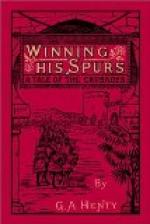With the fall of Acre, however, the dissensions between the two kings, which had for a while been allowed to rest while the common work was to be done, broke out again with renewed intensity. The jealousy of Phillip Augustus was raised to the highest point by the general enthusiasm of the combined armies for the valiant King of England, and by the authority which that monarch exercised in the councils. He therefore suddenly announced his intention of returning to France.
This decision at first occasioned the greatest consternation in the ranks of the crusaders; but this feeling was lessened when the king announced that he should leave a large portion of the French army behind, under the command of the Duke of Burgundy. The wiser councillors were satisfied with the change. Although there was a reduction of the total fighting force, yet the fact that it was now centred under one head, and that King Richard would now be in supreme command, was deemed to more than counterbalance the loss of a portion of the French army.
Before starting on the march for Jerusalem, King Richard sullied his reputation by causing all the defenders of Acre to be put to death, their ransom not having arrived at the stipulated time.
Then the allied army set out upon their journey. The fleet cruised along near them, and from it they obtained all that was requisite for their wants, and yet, notwithstanding these advantages, the toil and fatigue were terrible. Roads scarcely existed, and the army marched across the rough and broken country. There was no straggling, but each kept his place; and if unable to do so, fell and died. The blazing sun poured down upon them with an appalling force; the dust which rose when they left the rocks and came upon flat sandy ground, almost smothered them. Water was only obtainable at the halts, and then was frequently altogether insufficient for the wants of the army; while in front, on flank, and in rear hovered clouds of the cavalry of Saladin.
At times King Richard would allow parties of his knights to detach themselves from the force to drive off these enemies. But it was the chase of a lion after a hare. The knights in their heavy armour and powerful steeds were left behind as if standing still, by the fleet Bedouins on their desert coursers; and the pursuers, exhausted and worn out, were always glad to regain the ranks of the army.
These clouds of cavalry belonging to the enemy did not content themselves with merely menacing and cutting off stragglers. At times, when they thought they saw an opening, they would dash in and attack the column desperately, sometimes gaining temporary advantages, killing and wounding many, then fleeing away again into the desert.
Finding that it was impossible to catch these wary horsemen, King Richard ordered his bowmen to march outside his cavalry, so that when the enemy’s horse approached within bowshot they should open upon them with arrows; then, should the horsemen persist in charging, the archers were at once to take refuge behind the lines of the knights.




